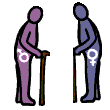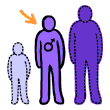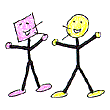|
|
- A- 'I 'u 'o' 'a'mut lhun' si'lu?
|
Is your grandmother home? |
- B- 'Uwu 'i'us 'a'mut lhunu si'lu.
|
My grandmother is not at home. |
- A- 'I 'u 'o' 'a'mut kwthun' si'lu?
|
Is your grandfather at home? |
- B- 'Uwu 'i'us 'a'mut kwthunu si'lu.
|
My grandfather is not at home. |
- A- 'I 'u 'o' 'a'mut kwthun' shuyulh?
|
Is your older brother at home? |
- B- 'Uwu 'i'us 'a'mut kwthunu shuyulh.
|
My older brother is not at home. |
- A- 'I 'u 'o' 'a'mut lhun' shuyulh?
|
Is your older sister at home? |
- B- Hee'. 'E'uth thunu shuyulh.
|
Yes. Here is my older sister. |
|
You can see from the meanings given for the kinship terms above that most kinship terms do not distinguish gender. That is, the same words are used for grandmother and grandfather, older brother and older sister. The same is true for aunt and uncle, son and daughter, etc. For singular nouns, gender is marked by the article, or the words 'e'ut and 'e'uth, as in the examples below.
| 'E'ut tthunu shuyulh. |
My older brother is here. |
| 'E'uth thunu shuyulh. |
My older sister is here. |



